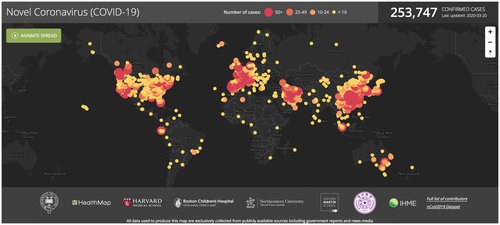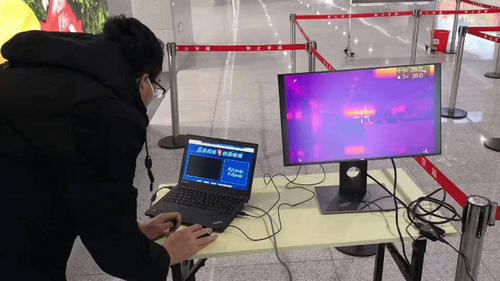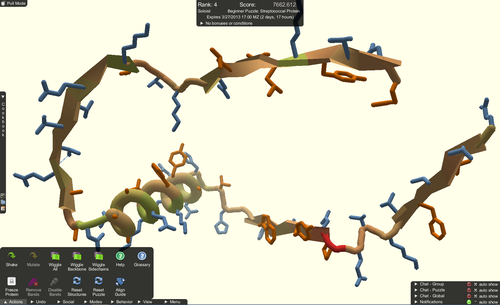Our primer on some of the most popular text annotation tools for NLP.
4 Ways AI is Tackling the Coronavirus Pandemic
Eduardo Cerna, March 20, 2020

From social media monitoring to vaccine discovery, here are some novel ways in which AI is aiding to counter the epidemic:
1) Social Media Monitoring
A number of startups have leveraged natural language processing by analyzing social media posts, search queries, news reports, and even airline routes to predict where the disease may appear next. Healthmap is a startup that first made an appearance after the SARS outbreak in the early 2000s and has since built a platform that aggregates and organizes data from health organizations to generate a map that visualizes how diseases spread.

Healthmap data visualization as of March 20, 2020
A Canadian disease surveillance startup called BlueDot appeared in the media spotlight by allegedly predicting the coronavirus outbreak in China even before health authorities issued an official warning. BlueDot’s algorithm analyzes foreign language news reports as well as animal and plant disease networks to notify its clients about places that should be avoided.
The use of AI in social media hasn’t been limited to monitor the outbreak, however, as news emerged earlier this week regarding Facebook’s content moderators. Since the vast majority of the content moderation efforts have historically been outsourced to contractors working in top-security conditions due to data security concerns, these workers have been barred from working from home amidst the outbreak. This particular situation is forcing tech giants to precariously deploy machine learning solutions for content moderation. This is a huge bet on AI, especially given how error-prone these systems still are; most recently for preventing users from sharing official COVID-19 advice from health organizations.
Read more:
Considering AI in your company?
TALK TO OUR EXPERT2) Scientific Paper Mining
Machine learning techniques have been utilized in the past to develop novel drugs and make predictions about their interactions with other compounds.
Now, the White House has urged tech companies such as Google and Microsoft to make use of the available technologies to mine through thousands of research papers and journal articles made available to them, in hopes that it can help provide key insights and answers about the coronavirus. The database and submissions by researchers are being hosted on Google’s Kaggle service, which is usually used for managing machine learning competitions online.
Read more:
- Reuters: White House urges researchers to use AI to analyze 29,000 coronavirus papers
- White House: Call to Action to the Tech Community on New Machine Readable COVID-19 Dataset
3) Vaccine Discovery
Google-owned AI company DeepMind is leveraging its AlphaFold system to help understand the structure of the virus in hopes that it can help speed up the discovery of a vaccine, or at least, find other existing medicines that could potentially be used to treat the disease. While DeepMind claims that it’s an experimental technology, it’s paving the way for how medicines and vaccines get discovered in the future.
On the other side of the pond, British startup Exscientia is speeding up the pace at which vaccines can be developed. Earlier this year, the drug created by its algorithms was put to human trials.
Read more:
- BBC: Coronavirus: How can AI help fight the pandemic?
- Singularity Hub: DeepMind’s Protein Folding AI Is Going After Coronavirus
4) Screening and Public Safety
In order to monitor and manage the spread of the coronavirus, it is imperative that people in affected areas have access to quick and effective testing. Chinese tech giant Baidu has deployed novel solutions that leverage AI to screen large amounts of people while causing the least disruption. One such way is an AI-powered, non-contact infrared sensor which is able to detect the body temperature of hundreds of commuters per minute while flagging those who may have a fever - a common symptom of coronavirus infection. On top of that, Baidu has also deployed software that can detect whether people in crowds are wearing face masks, even in difficult environments such as train stations.
In addition, researchers have been able to take advantage of computer vision capabilities by analyzing CT scans in order to look for signs of pneumonia in patients.

Photo credit: MIT Technology Review
Read more:
- MIT Tech Review: How Baidu is bringing AI to the fight against coronavirus
- The Next Web: Baidu open sources AI to identify people without face masks
Honorable Mentions: Non-AI Initiatives
While not strictly in the AI field, there are other tech initiatives that are also aimed towards fighting the coronavirus outbreak. Helpful Engineering is helping tackle the pandemic by creating a network of close to 3,000 volunteers that is made up of scientists, doctors, engineers, and nurses among others. The organization's mission is to mobilize resources such as life-saving air and tools to places where they most need it. For more information on their activities and how to become a volunteer, visit their website.
A number of open-source software initiatives have also appeared around the internet to support efforts in hospitals and care centers. One example of this is the CHIME software, which helps with managing and forecasting the number of people that will need treatment. The software also helps hospitals to prepare for worst-case scenarios.
In a less traditional way, the Foldit puzzle is a game that users can play to help discover drugs that could be used against the coronavirus. Similarly, there’s a Stanford-sponsored distributed computing project in which users can ‘donate’ unused computer power. By downloading the Folding@home platform, users can help run simulations and aid in finding protein structures that have druggable sites.

Foldit game
On a more controversial note, the Chinese government has also released an app that helps citizens to know whether they have been in close contact with anyone infected by the virus. The people identified as being at risk are encouraged to stay home and inform the authorities. Israel has adopted similar measures, passing an emergency law that allows the government to use mobile data in order to track the disease.
Read more:
Read More Articles
The key to any successful computer vision project, or any machine learning project for that matter, lies in the quality of the data.
Plain English intro to your first AI project: why the idea of accuracy is dangerous and why 99% is probably not the number you need.



